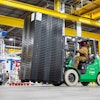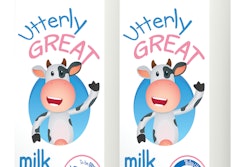The folks at FastCompany.com put together an interesting list of what they consider the year's most innovative companies in the food and beverage sector. Some of these have been making headlines already this year, but all of them are forcing the industry to change the way they think about food and how we produce it.
1. Beyond Meat - For rerouting agriculture’s environmental impact. Meat production, which results in copious greenhouse gases, is expected to double by 2050. But Beyond Meat has created a meat alternative good enough to tempt devout carnivores. It aligns soy and pea proteins so they mimic meaty texture, without antibiotics, hormones, or transfats. Its "chicken" strips and taco "beef " crumble hit the market last year.
2. BrightFarms - For pulling gas-belching 18-wheelers off the road. BrightFarms works with the big grocers to harvest lettuce, tomatoes, and herbs on-site (or nearby) in large hydroponic greenhouses. This has resulted in cutting transportation costs and waste, lowering prices, and adding days to the shelf life of perishable foods.
3. Farmland LP - For gobbling up land for more sustainable crops. Farmland LP is converting to organic the 6,750 acres of land (worth $50 million) it purchased in California and Oregon. It leases the land to farmers who pay rent or a share of their profits. The land is sustainably managed, and farmers and their crops and livestock are rotated from pasture to pasture to keep the soil healthy.
4. Chipotle - For going where food companies don't dare to go. After a year-long test, Chipotle is offering new spicy organic tofu dishes chain-wide. Sofritas, a chorizo-like shredded and braised bean curd, is the first addition to Chipotle's menu in its 20-year history. The chain also launched a branded TV comedy series about an egregious big-agriculture company. Farmed and Dangerous, which appears on Hulu, is a risky satire and big bet for a food company.
5. Kind Healthy Snacks - For making grab-and-go snacks that are nutritious and delicious. With its natural ingredients and irresistible combinations--"maple glazed pecan & sea salt"--Kind offers a rare snack-food marriage: health and taste. Another rarity is its transparent packaging: You see what you're getting. Kind makes five of the top 10 products in the nutritional-bar category.
6. Fairlife - For making more nutritious milk. Mike McCloskey, a veterinarian-turned-farmer-turned-entrepreneur, is revolutionizing the dairy industry. Using his patented membrane-filtration process, Fairlife produces Core Power, a silky-smooth high-protein milk--little fat, no lactose, but with natural honey--that athletes, retailers, and the world's largest soft-drink maker are clamoring for.
7. LiquiGlide - For liberating every last drop. What MIT researcher Dave Smith envisioned as a car-windshield coating has become a breakthrough in food packaging. LiquiGlide CEO Smith invented a lubricant that when incorporated in plastic or glass containers enables the most viscous contents to easily slip out. No more pounding the ketchup bottle. No more senseless food waste.
8. Hampton Creek Foods - For creating the incredible, edible, plant-based egg. Founder and CEO Joshua Tetrick, who worked for years to alleviate poverty in sub-Saharan Africa, has created an alternative to crowded chicken farms. Food scientists and a chef at his high-tech food startup found a plant with the biochemical properties of eggs.
9. AgLocal - For creating the next-generation meat market. This three-year-old, Missouri-based startup identified the major hurdles faced by small, sustainable ranchers: They can't afford to deliver around town the small orders of specialty cuts chefs want. The company's online meat market allows farmers to connect directly with chefs, and both benefit.
10. Blue Bottle Coffee - For taking its time--and ours. Founder James Freeman views coffee-making as a craft and a sensory experience. At a dozen locations in New York and San Francisco, he's created an alternative to commoditized java served at a fast-food pace. His cafes don't have multiple sizes or candy-like flavors or pre-brewed coffee. And they often have long lines, for what customers believe is worth the wait.
To read more, click HERE.



















